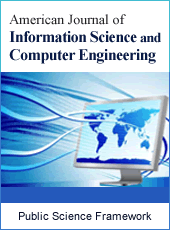American Journal of Information Science and Computer Engineering
Articles Information
American Journal of Information Science and Computer Engineering, Vol.3, No.3, May 2017, Pub. Date: Jun. 14, 2017
Standardization Problem in the Implementation of ICT at University
Pages: 39-51 Views: 2758 Downloads: 915
[01]
Krzysztof Gołuch-Trojanek, Warsaw University of Technology, Faculty of Management, Warsaw, Poland.
[02]
Katarzyna Rostek, Warsaw University of Technology, Faculty of Management, Warsaw, Poland.
Universities are divided into faculties that can operate at their own. Being consistent with university-wide law faculties can develop their own systems that will help them to complete teaching process. Every system implementation is different; because of that development of model can make improvements on how university works because of shorten time needed to prepare, run and finalize final implementation. Main goal of this article is to determine if problem of standardization of implementation of IT systems at university exists. Analysis showed that changing one system and by the same time maintaining consistency with business strategy leads to improved results, what can be translated into lowering costs and growing efficiency of business.
University, Standardization, Business Organization, Planning, IT Implementation
[01]
Bakar Abbul Hamid Abu, Choy Chong Siong, Lin Binshan; Radzi Najmi Mohd, Towards e-Government: End-User Satisfaction with IT Implementation at Royal Malaysian Customs, International Journal of Information Technology & Decision Making, 24 January 2014, Vol.13(03), pp. 451-471.
[02]
Boulding Kenneth E., General Systems Theory—The Skeleton of Science, Management Science, 1956, Vol. 2(3), p.197-208.
[03]
Bowen William, Chingos Matthew, Lack Kelly, Nygren Thomas, Interactive learning online at public universities: evidence from a six-campus randomized trial, Journal of policy analysis and management, Jan 2014, Vol. 33(1), pp.94-111.
[04]
Brown A. D., Starkey K. The effect of organizational culture on communication and information, Journal of Management Studies 31(6), 807–828, 1994.
[05]
Buchmayer Christian, Greil Michael, Hikl Anna-Laetitia, Kaiser-Dolidze Olivia, Miniberger Clemens, Usability on the Edge: The Implementation of u:cris at the University of Vienna, Procedia Computer Science, 2014, Vol. 33, pp. 103-109.
[06]
Choi Dong, de Vries Henk, Integrating standardization into engineering education: the case of forerunner Korea, International Journal of Technology and Design Education, 2013, Vol. 23(4), pp.1111-1126.
[07]
F Bréchignac, G Desmet, NATO Advanced Research Workshop on Ecological Standardization and Equidosimetry for Radioecology and Environmental Ecology 2005.
[08]
Haeder Simon F., Weimer David L., You Can't Make Me Do It: State Implementation of Insurance Exchanges under the Affordable Care Act, Public Administration Review, 2013, Vol. 73(s1), pp. S34-S47.
[09]
Ianoz M., Standardization and the university world, 2003 IEEE International Symposium on Electromagnetic Compatibility, 2003, Vol. 2, pp. 977-979.
[10]
Jackson Stephen, Understanding IS/IT implementation through metaphors: A multi-metaphor stakeholder analysis in an educational setting, Computers in Human Behavior, February 2016, Vol. 55, pp. 1039-1051.
[11]
Jackson Stephen, Organizational culture and information systems adoption: A three-perspective approach, Information and Organization, Volume 21, Issue 2, April 2011, Pages 57–83.
[12]
Jung Wonjin, Hong Suk-Ki, The Effects of Metaphors in the Interface of Smartphone Applications on Users' Intention to Use, Asia Pacific Journal of Information Systems; Vol. 24, No. 3, September 2014, p. 255-279.
[13]
Kobayashi Kiyoshi, Standardization Education Experiments in Oversea Countries on Asset Management by Kyoto University, Journal of JSEE, 2015, Vol.63(3), pp. 322-327.
[14]
Kungwani Pooja, Risk Management - An Analytical Study, IOSR Journal of Business and Management. Feb 2014. pp. 83–89.
[15]
Moreno-Díaz Roberto, Pichler Franz, Computer Aided Systems Theory - EUROCAST 2003, International Workshop on Computer Aided Systems Theory, 2003.
[16]
Paulins Nauris, Moodle implementation at the Latvia University of Agriculture information technology system architecture; Research for Rural Development, 2010, Vol. 2, pp. 204-207.
[17]
Philip George, McKeown Ian, Business Transformation and Organizational Culture: The Role of Competency, IS and TQM, European Management Journal Vol. 22, No. 6, pp. 624–636, 2004.
[18]
Pines, Jesse M, Evidence-based standardization and ED admission rate variation in US children's hospitals, Pediatrics, September 2014, Vol.134(3), pp. 605-6.
[19]
Saltzman Jon, Chatterjee Samir, Raman Murali, A framework for ICT standards creation: The case of ITU-T standard H.350, Information Systems, 2008, Vol.33(3), pp. 285-299.
[20]
Simon P. Philbin, Design and implementation of the Balanced Scorecard at a university institute, Measuring Business Excellence, 2011, Vol. 15(3), p. 34-45.
[21]
Spivak Steven M., Brenner F. Cecil, Standardization Essentials Principles and Practice Marcel Dekker AG, 2001.
[22]
Tamura, Suguru, Generic definition of standardization and the correlation between innovation and standardization in corporate intellectual property activities, Science and Public Policy, 2013, Vol. 40(2), pp. 143-156.
[23]
WHO Expert Committee on Biological Standardization: Fifty-second Report, WHO Expert Committee on Biological Standardization. Meeting, 2004.
[24]
WHO Expert Committee on Biological Standardization: Fifty-Sixth Report: Technical Report Series No. 941, WHO Expert Committee on Biological Standardization. Meeting World Health Organization Staff; World Health Organization, 2007.
[25]
Wilkinson, Lee A., Encyclopedia of Child Behavior and Development, pp 1466-1468.
[26]
Xiea Zongjie, Hall Jeremy, McCarthyc Ian P., Skitmore Martin, Shena Liyin, Standardization efforts: The relationship between knowledge dimensions, search processes and innovation outcomes, Technovation. Volumes 48–49, February–March 2016, Pages 69–78.

ISSN Print: 2381-7488
ISSN Online: 2381-7496
Current Issue:
Vol. 7, Issue 3, September Submit a Manuscript Join Editorial Board Join Reviewer Team
ISSN Online: 2381-7496
Current Issue:
Vol. 7, Issue 3, September Submit a Manuscript Join Editorial Board Join Reviewer Team
| About This Journal |
| All Issues |
| Open Access |
| Indexing |
| Payment Information |
| Author Guidelines |
| Review Process |
| Publication Ethics |
| Editorial Board |
| Peer Reviewers |


